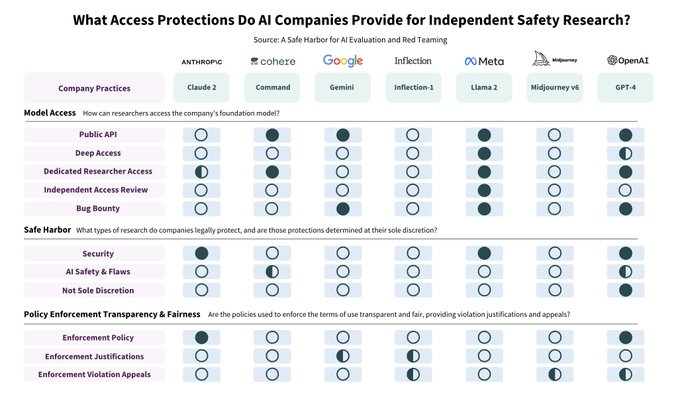
Zheng-Xin Yong (Yong)
@yong_zhengxin
Followers
926
Following
1,462
Media
37
Statuses
298
PhD @BrownCSDept || RS Intern @ FAIR @AIatMeta 🤖 multilingual + responsible AI past: @CohereForAI @BigscienceW
Bay Area
Joined January 2018
Don't wanna be here?
Send us removal request.
Explore trending content on Musk Viewer
#GranHermano
• 471246 Tweets
FREENBECKY AT WORKPOINT
• 217796 Tweets
Willie Mays
• 169902 Tweets
Chino
• 107232 Tweets
Juliana
• 99934 Tweets
TSOU OST BY LINGLING
• 98002 Tweets
Alperovich
• 86736 Tweets
Game 6
• 80134 Tweets
SE HIZO JUSTICIA
• 34980 Tweets
#HappyBirthdayRahulGandhi
• 34283 Tweets
ドジャース
• 33383 Tweets
Dario
• 32604 Tweets
Panthers
• 32313 Tweets
Telefe
• 32045 Tweets
#GH2024
• 30547 Tweets
Edmonton
• 27140 Tweets
SE FUE LA PELADA
• 26348 Tweets
Alfa
• 22668 Tweets
ホタルちゃん
• 21604 Tweets
シグウィン
• 19909 Tweets
#LetsGoOilers
• 19224 Tweets
Bautista
• 18655 Tweets
McDavid
• 18406 Tweets
#TheAcolyte
• 16744 Tweets
SE FESTEJA EN EL OBELISCO
• 16246 Tweets
Guercio
• 16053 Tweets
Say Hey Kid
• 14900 Tweets
Tinelli
• 13714 Tweets
帰還開拓者
• 11637 Tweets
WE LOVE YOU BEOMGYU
• 11294 Tweets
リベステ
• 10452 Tweets
Last Seen Profiles
A quick write-up about what I've learned so far in my PhD.
Super grateful to work with
@stevebach
at
@BrownCSDept
, and look forward to the remaining two/three years of my education.
1
20
130
(Repost for corrected Arxiv)
🧐What’s the best way to quickly adapt large multilingual language models to new languages?
We present our new paper from
@BigscienceW
🌸:
BLOOM+1: Adding Language Support to BLOOM for Zero-Shot Prompting.
📜
[1/9]
2
27
70
I will be presenting ‘Low-Resource Languages Jailbreak GPT4’ at NeurIPS
@solarneurips
.
⭐️It is also selected as the best workshop paper!
Let’s grab ☕️ if you wanna chat about AI safety! Happy to also talk about my involvement with Responsible Release of
#Aya
w/
@CohereForAI
0
10
57
Aya has launched!!! 🌍 I'm so excited thinking how Aya (open-source models & dataset with HUGE language coverage) will accelerate multilingual NLP.
It's been so fulfilling to work with other amazing collaborators to get Malay represented and analyze the safety of Aya.
0
7
54
As a Computer Science PhD student at Brown University, my 12-month stipend for this year is ~$41000, which covers medical insurance (United Healthcare) and dental insurance (Delta PPO Plus Premier). I have to pay ~$70 in fees per semester.
#StipendTransparency
To increase transparency around grad school stipends, retweet this tweet with your department, university, and annual stipend. I'll go first: I'm a PhD student in the Computing and Mathematical Sciences (CMS) department at Caltech, and I'm paid $36k/year.
#StipendTransparency
81
191
1K
0
1
36
I'm feeling so happy about this recognition for the IndoNLP research group, especially since SEA languages have been very underrepresented in major NLP conferences.
Please check out their paper:
0
0
32
Happy to share that BLOOM+1 has been accepted to
#ACL2023
/
#acl2023nlp
(thanks to all
@BigscienceW
contributors)! If you want to know how to adapt BLOOM/BLOOMZ to an unseen language, come check out our work!
TL;DR: smaller models benefit from continued pretraining, and larger
(Repost for corrected Arxiv)
🧐What’s the best way to quickly adapt large multilingual language models to new languages?
We present our new paper from
@BigscienceW
🌸:
BLOOM+1: Adding Language Support to BLOOM for Zero-Shot Prompting.
📜
[1/9]
2
27
70
0
6
32
@xwang_lk
I was able to get it right on my first try. The reproducibility issue is a concern for these models.
2
1
31
Accepted the offer a week ago, but I'm still really excited to share that I will be joining
@BrownCSDept
PhD program.
1
1
30
Amazing panel talk on different dimensions of inclusivity (most important theme of AI right now imo).
They touched on how to integrate non-Western values, non-academicians such as Redditors/hacker, and local native speakers in our AI field.
Our panel discussion on **Responsible/Safe LLM research** with Roger Grosse, David Bau, Stella Biderman, Vinodkumar Prabhakaran (
@RogerGrosse
,
@davidbau
,
@BlancheMinerva
), moderated by Sara Hooker
@sarahookr
is starting! Come to Room R06 - R09 2nd Floor to join the discussion :)
1
1
26
0
2
29
I had a blast at
#acl2022nlp
! Here's my blog post sharing my first-time experience as a presenter, attendee, and volunteer at the NLP conference in person.
0
1
21
Happy to have the opportunity to present PromptSource and ongoing work on unseen language adaptation at
#acl2022
!
Made really good friends and had meaningful interactions in my first in-person conference/virtual poster presentation.
Photos but capped at 4 (b/c of Twitter lol)
1
0
20
Thanks AK for tweeting our work! Summary thread incoming 🧵
1
1
18
🎉 Excited to share that our multilingual work on predicting frame shifts is accepted to the
@lrec2022
main conf! [1/n]
2
3
17
Such a great talk about real-world harms by
@rajiinio
!
I learned so much about how LLMs affect diasporas users on Youtube – these real-world multilingual cases haven't been discussed widely enough in ML research literature.
We now have Inioluwa Deborah Raji
@rajiinio
on Grounded Evaluations for Assessing Real-World Harms!
0
1
12
0
2
14
Just passed my Capstone thesis defense
@MinervaSchools
under the advisership of
@patrickdkwatson
🔥!
Really appreciate all the support I have, especially as a first-gen college student studying abroad. Now I can't wait to graduate and start my research career.
6
0
13
Curating data and benchmarks is difficult, let alone languages that are often left behind in AI development.
Ambitious initiative currently led by
@HolyLovenia
to collect datasets for all SEA languages - if you speak any of the southeast Asian languages, come contribute!!
0
1
11
Personally the embargo created a lot of stress and forced us release premature work.
We were benchmarking LLMs on code-switching capability for EMNLP, and we were extremely worried that our work became irrelevant (model outdated or being updated) after the 5-month embargo.
1
0
11
🔥 Survey paper released!!
After spending lots of time going through code-switching papers, I firmly believe that the biggest priority is to expand the data (more languages and evaluation tasks).
🚨 New Paper
The Decades Progress on Code-Switching Research in NLP: A Systematic Survey on Trends and Challenges
📰 Paper:
We conduct a comprehensive study on 400+
#codeswitching
papers published at
@aclanthology
and ISCA from 1980s to present.
#NLProc
4
11
56
1
0
10
Come join the project to boost the representations of your languages in multilingual LMs!
Been working on the Malay language and there's so much work to be done. This initiative is a big step towards a truly multilingual world.
0
2
9
@Teknium1
Shameless self-plug on unique task-specific datasets 🙂
Synthetic task datasets that are competitive with expert-translated gold data for 17 low-resource languages.
- sentiment analysis:
-topic classification:
1
1
9
I'm so happy to see more and more LLMs released for SEA languages!
Really appreciate the work the authors have put into this!
1
0
8
Appreciate all the feedbacks from
@KreutzerJulia
@gentaiscool
@davlanade
@ruochenz_
@AlhamFikri
and Brown University Superlab. [11/n]
0
0
7
This is amazing work done in BigScience's multilingual-modeling group.
@haileysch__
@Muennighoff
@AlhamFikri
@davlanade
@eKhalid_
@sbmaruf
@lintangsutawika
@wittgen_ball
@aobaruwa
@gentaiscool
@BlancheMinerva
@dragomir_radev
@VNikoulina
[8/9]
1
1
7
@Teknium1
It’s important to consider model size as well. shows that in tuning for a new language in a limited compute/data setup, smaller models are better with full finetuning whereas larger models are better with adapters.
1
0
7
Finished two days of virtual PhD student visit weekend at
@BrownCSDept
!
I am glad that I attended most of the events in person, even though I had multiple deadlines due this week and had to wake up at 6 am.
Here are 3 things that stood out to me:
1
1
6
I fiddled with
#ChatGPT
and I'm impressed by its multilinguality.
For instance, it perfectly translates a trilingually code-mixed sentence and even correctly adds the context to when we'd say such a sentence.
2
0
6
@BlackHC
Yea - this is a good point. See my reply to
@deliprao
and I agree I might have passed the bar (I didn't know that before writing this post)
@deliprao
Thanks for sharing this! Oof, so it is true that the hiring has also looked at shallow index such as # publications and H-index. That really sucks.
One thing I think is also relevant is the "influencer" game nowadays in order to boost the metrics. 🥲
1
0
1
0
0
4
I have been mentored by
@TorrentTiago
for two years and worked with
@FrameNetBrasil
for
@gsoc
2020. Highly recommend it 🔥!
- Interesting research projects
- Amazing learning experience (+ chance to publish)
- Mentors look out for your best interest
Third time is the charm, they say! Check out our charming ideas for Google Summer of Code 2021 (
@gsoc
) and come work
@FrameNetBrasil
this summer! We do have the coolest mentors, you know!
1
2
6
0
1
4
@sivil_taram
@bobz00528
Thanks for the mention
@sivil_taram
!
It seems like code-switching is a non-trivial task for multilingual LLMs. To add to the discussion, my colleague
@ruochenz_
has a paper that shows similar findings across sentiment analysis, MT, summarization, and LID
1
0
3
Independent researchers have been helping companies expose safety vulnerabilities & design safer GenAI, but how are we being protected?
Much needed call-to-action (led by
@ShayneRedford
) for companies to provide legal and technical safe harbor for researchers!!
0
1
4
@sarahookr
Would love to collaborate on this direction!
We found surprising scaling effects on adaptation in low-resource settings.
(Spoiler: more trainable parameters isn't always good – there can be inverse scaling)
0
0
2
@vinodkpg
@solarneurips
@RogerGrosse
@davidbau
@BlancheMinerva
@sarahookr
Really learned a lot from the panel and your answers on community building. Thank you!!
0
0
1
Responsible disclosure: We’ve shared our findings with OpenAI before publicly releasing this work.
Check out our work here:
Work done with
@CriMenghini
and
@stevebach
on GPT-4-0613
(n/n)
1
0
2
@solarneurips
@usmananwar391
@LauraRuis
@_achan96_
@yawen_duan
@XinCynthiaChen
@ethayarajh
Thank you for this amazing workshop!
0
0
3
@AlhamFikri
@gentaiscool
@sam_cahyawijaya
@seb_ruder
@eltimster
@RicoSennrich
@FajriKoto
@rmahendrarm
Huge congrats!!
0
0
3
🥳This work was done during my internship at Google Summer of Code
#GSoC
2020 under the guidance of
@TorrentTiago
,
@CzuloOliver
,
@patrickdkwatson
, and Collin F Baker! It’s been a long haul, and lots of future work are needed in this multilingual frame semantics space. [n/n]
0
1
3
@deliprao
😅 I didn't realize how insane this is until you point it out.
I guessed that the PhD application process, which already expects students to have top-tier conference publications under their belt, already numbs me.
1
0
3
@sarahookr
@cohere
@CohereForAI
Congratulations on your two-year anniversary! 🎉
It's incredible and inspiring to see all the progress that has come from
@CohereForAI
.
Here's to more exploration and success in the years to come! 🚀
0
0
3
@AlhamFikri
Interesting finds!! Safety guardrails are very fragile, and I can totally see how mixing languages, as a second-order language attack vector, can bypass whatever multilingual guardrails in-place.
0
0
2
@ShayneRedford
@MIT
@RobertMahari
@naana_om
@wwbrannon
@TobinSouth
@katyilonka
@alex_pentland
@jad_kabbara
Congrats Shayne!! Very timely work
0
0
2
@SapienzaNLP
@IJCAIconf
@luigi_proc
@edoardo_barba
@FMartelli25
@RNavigli
@ERC_Research
@elexis_eu
This is an amazing paper! Would love to use the code, but the GitHub code provided in the paper is not available. Is there any way to access the code?
1
0
2
Check out our paper for more details. We also open-source the code and all data we have generated. [10/n]
Work done together with amazing co-authors
@CriMenghini
@stevebach
📃 Paper:
💻 Code:
📚 Data:
1
0
2
It's amazing to work with
@stevebach
(and to be under his supervision for my Ph.D.) 👏👏👏 He has a very high level of engagement and cares deeply about the progress of the ML community.
🌸 Behind the scenes 👀 We’re delighted to introduce to you
@stevebach
! Stephen is co-charing the Prompt Engineering Working Group, investigating the emergence of 0-shot prompting behaviors in very large language models and making 0-shot prompting abilities more robust. 👏
0
5
39
0
0
2
@AlhamFikri
@mbzuai
Congrats Aji! Can't wait to see your lab grows and the work coming out from it!
0
0
2
Thank you
@deliprao
for sharing this data point.
This contrast has made me realize that how terribly miscalibrated this job market is right now as supply (or people's interests) heavily outstrips demand.
Finger-crossed for all others looking for internships and new grad jobs
1
0
2
@faisal_thisis
It is great meeting you Fahim! I am sure we will cross path again in conferences
0
0
1
@albertwebson
It's amazing to work with you (iterations are a nightmare, but we got it done eventually)!
0
0
1
@TaliaRinger
Thanks for this thread! Any recommended way to improve creativity, or the ability to synthesize, in research work?
1
0
1
@TaliaRinger
Thanks for the detailed response! From how you've described, it seems that it is a combination of observation and deep analysis. And certainly, your instinct of choosing what problems to engage with.
0
0
1















































































